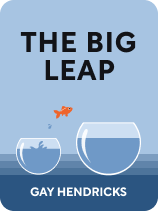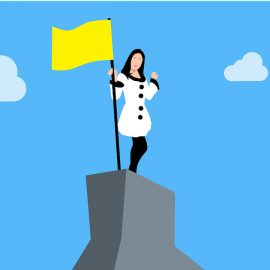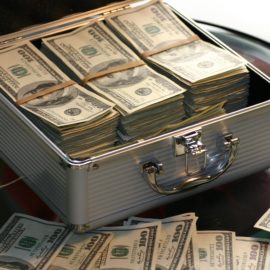

This article is an excerpt from the Shortform book guide to "The Big Leap" by Gay Hendricks. Shortform has the world's best summaries and analyses of books you should be reading.
Like this article? Sign up for a free trial here .
Do you feel stuck? Do you feel as though something is missing in your life, even though you can’t put your finger on what exactly it is?
Many people are plagued internally by a sense that there’s something missing in their life. If this sounds like you, you may be unconsciously limiting yourself by the “Upper Limit Problem”—an internal threshold for the maximum degree of success and happiness you’ll allow yourself to experience. According to Gay Hendricks, you get closer to this threshold as you progress further through levels of success.
Here’s how Hendricks defines levels of life success and how progressing through them moves you closer to the Upper Limit Problem.
Levels of Success
Hendricks defines four distinct levels of success people occupy. As we accomplish more in life, we move through subsequently higher levels, nearing the Upper Limit Problem. These levels can be described as:
Stagnancy
In this level of life, Hendricks explains, you accomplish little to nothing, because you waste time and energy on doing things you’re not good at, rather than on things you excel at. You’re continually frustrated and spinning your wheels, because you aren’t homing in on your skills and talents, and you stubbornly refuse to admit that there are just some things you aren’t cut out for. For example, you may be stuck in a dead-end job you hate, or unable to hold down jobs, and you feel like a failure. In fact, the problem may be that you’re just not pursuing what you’re good at. You might be achieving much more in a different career path that’s more aligned with your natural abilities.
Adequacy
At this level, you appear to be doing fine; you’ve achieved some level of success and are making progress. You may be on par with your peers, but not really excelling beyond them. For example, if your friends and family think you’re “doing well” but you still feel like you’re falling short of your potential, or you find you’ve hit a wall in terms of advancement, you may be stuck at the level of adequacy. To go beyond adequacy, Hendricks advises that you may just need to re-focus and re-prioritize, thinking a bit outside the box to imagine how you could aim a little higher.
High Achievement
At this level you’ve reached a degree of accomplishment that others admire. You’re good at what you do, and you’re solidly “successful” according to society’s standards. You can get very comfortable in this zone, because on the surface you may look and feel like you’ve reached your highest potential. But Hendricks warns us that there are two potential problems when you reach this level of achievement:
1. You still have a nagging sense that something is missing in your life. Deep down something tells you there must be more, but you can’t put your finger on what it is. This is your inner calling to true fulfillment beckoning you.
2. This is also where you’re in danger of encountering the Upper Limit Problem, which acts as a barrier to reaching that state of fulfillment. These two forces—your call to fulfillment and your upper limit—work against each other at this level. When you feel the satisfaction of this much accomplishment, you’re likely to begin to engage in self-sabotage, to ensure you don’t go beyond that. This is due to deep-seated feelings of unworthiness or other limiting beliefs we’ll discuss in the next section.
(Shortform note: In The Happiness Trap, Russ Harris explains that humans aren’t hard-wired for happiness, and the pursuit of that often has the opposite result. We’re driven to accumulate as a survival instinct, but in the modern world, this relentless drive to acquire more material wealth keeps us in a vicious cycle because we never know when enough is enough. This is similar to how Hendricks describes the High Achievement level of success, and why such people may still feel like something is missing.)
State of Fulfillment
According to Hendricks, this is the level we’re all meant to reach in life—it’s your true life purpose. When you transcend the limitations of your upper limit, you reach your highest potential, and there’s no boundary on the amount of love, wealth, and joy you can experience. In this state, you’re not just achieving, but thriving. Hendricks describes this as breaking out of all the “boxes” of the previous levels and living a life of limitless expansion.
| The Fulfilled Life Psychology researchers created a measure for assessing fulfillment in life called the Fulfilled Life Scale. Using this scale, they found that a fulfilled life was most associated with a high degree of self-actualization and realization, meaning the ability to live as your true authentic self, to pursue goals that are personally meaningful to you, and to make a positive impact on others or society. This research also showed that those who considered finding fulfillment important and spent time consciously pursuing it were more likely to feel fulfilled. These conclusions align with Hendricks’s advice later in the book to envision your state of fulfillment by uncovering what kinds of life work and activity enliven you, and to make this a central focus of your life. |

———End of Preview———
Like what you just read? Read the rest of the world's best book summary and analysis of Gay Hendricks's "The Big Leap" at Shortform .
Here's what you'll find in our full The Big Leap summary :
- How to overcome the psychological barriers to success and fulfillment
- Why most people have a self-imposed limit to happiness
- How to identify your own false beliefs and stop self-sabotaging






